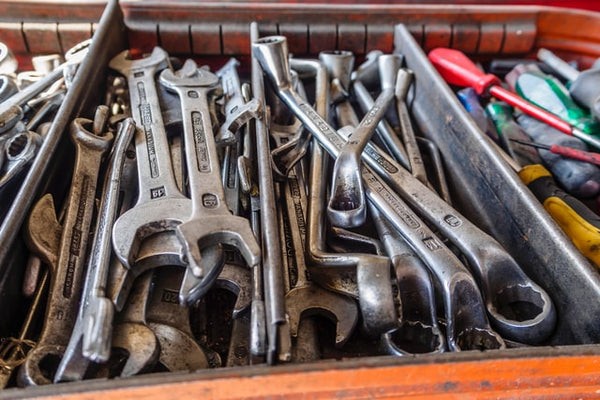Whether you drive a classic car or a brand new model, there’s always a chance something might need fixing. With the right tools and some basic car repair knowledge, you can perform many car maintenance tasks yourself, saving money on costly trips to the mechanic. These tools are not only helpful for routine maintenance but also invaluable in emergencies.
Essential Tools for Your Car Repair Toolkit
A well-stocked toolkit is crucial for tackling common car problems. Here are 12 essential Tools You Need To Fix A Car:
1. Socket Sets
A comprehensive socket set, including both SAE (standard) and metric sizes, along with various drive sizes (1/4″, 3/8″, and 1/2″), is a cornerstone of any car repair toolkit. Thin-walled sockets are invaluable for delicate work in tight spaces.
2. Pliers and Wire Cutters
Pliers and wire cutters are essential for electrical work and various other tasks. A set containing diagonal cutters, slip-joint pliers, needle-nose pliers, and groove-joint pliers will cover most needs.
3. Combination Wrench Set
While socket sets are versatile, a combination wrench set is necessary for reaching fasteners in tight or awkward positions where sockets won’t fit.
4. Screwdrivers
A comprehensive screwdriver set with various sizes and types of heads (Phillips, flathead, Torx) is indispensable for working with different screws and fasteners. Ratcheting screwdrivers can significantly speed up the process.
5. Zip Ties
Zip ties are invaluable for bundling wires and cables, keeping your work area organized and preventing tangles.
6. Tire Pressure Gauge
Maintaining proper tire pressure is crucial for safety, fuel efficiency, and tire longevity. A reliable tire pressure gauge, either digital or analog, is a must-have.
7. Duct Tape
Duct tape is incredibly versatile for temporary repairs, from patching small holes to securing loose components. It’s a valuable tool to have in emergencies.
8. Jumper Cables
Jumper cables are essential for jump-starting a car with a dead battery, saving you from being stranded. Choose heavy-duty cables with strong clamps for reliable performance.
9. Basic Mechanic’s Tool Set
A pre-assembled mechanic’s tool set often provides a cost-effective way to acquire a collection of commonly used tools, including sockets, wrenches, pliers, and screwdrivers.
10. Lubricants and Penetrating Oil
Penetrating oil helps loosen rusted or seized fasteners, while lubricants keep moving parts operating smoothly and prevent corrosion.
11. Breaker Bar
A breaker bar provides extra leverage for loosening extremely tight or stubborn bolts, especially lug nuts on wheels.
12. Latex Gloves
Latex gloves protect your hands from grease, grime, and chemicals while working on your car.
Conclusion
Having the right tools is the first step towards successful DIY car repair. Start with these essentials and gradually expand your toolkit as you gain experience and tackle more complex tasks. Remember to consult your car’s repair manual for specific instructions and always prioritize safety when working on your vehicle.


